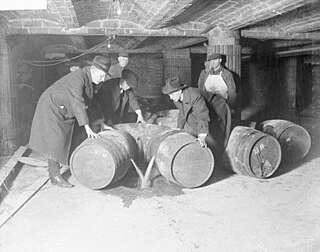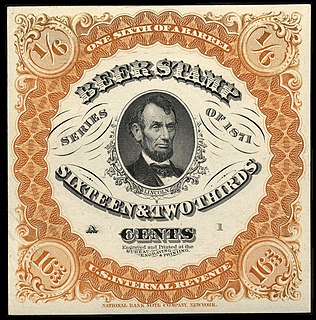
The Department of the Treasury (USDT) is the national treasury of the federal government of the United States where it serves as an executive department. The department oversees the Bureau of Engraving and Printing, and the U.S. Mint; these two agencies are responsible for printing all paper currency and coins, while the treasury executes its circulation in the domestic fiscal system. The USDT collects all federal taxes through the Internal Revenue Service; manages U.S. government debt instruments; licenses and supervises banks and thrift institutions; and advises the legislative and executive branches on matters of fiscal policy. The department is administered by the secretary of the treasury, who is a member of the Cabinet. The treasurer of the United States has limited statutory duties, but advises the Secretary on various matters such as coinage and currency production. Signatures of both officials appear on all Federal Reserve notes.

The Bureau of Alcohol, Tobacco, Firearms and Explosives (ATF) is a domestic law enforcement agency within the United States Department of Justice. Its responsibilities include the investigation and prevention of federal offenses involving the unlawful use, manufacture, and possession of firearms and explosives; acts of arson and bombings; and illegal trafficking and tax evasion of alcohol and tobacco products. The ATF also regulates via licensing the sale, possession, and transportation of firearms, ammunition, and explosives in interstate commerce. Many of the ATF's activities are carried out in conjunction with task forces made up of state and local law enforcement officers, such as Project Safe Neighborhoods. The ATF operates a unique fire research laboratory in Beltsville, Maryland, where full-scale mock-ups of criminal arson can be reconstructed. The agency is led by Marvin Richardson, Acting Director. Richardson previously served as the Associate Deputy Director and Chief Operating Officer, the second highest ranking official at ATF, from October 2019 to June 2021. The ATF has 5,101 employees and an annual budget of $1.274 billion (2019).

The Alcohol and Tobacco Tax and Trade Bureau, statutorily named the Tax and Trade Bureau and frequently shortened to TTB, is a bureau of the United States Department of the Treasury, which regulates and collects taxes on trade and imports of alcohol, tobacco, and firearms within the United States.
A special agent is an investigator or detective for a governmental or independent agency, who primarily serves in criminal investigatory positions. Additionally, many federal and state special agents operate in "criminal intelligence" based roles as well. Within the U.S. federal law enforcement system, dozens of federal agencies employ federal law enforcement officers, each with different criteria pertaining to the use of the titles Special Agent and Agent.
Excise tax in the United States is an indirect tax on listed items. Excise taxes can be and are made by federal, state and local governments and are not uniform throughout the United States. Some excise taxes are collected from the producer or retailer and not paid directly by the consumer, and as such often remain "hidden" in the price of a product or service, rather than being listed separately.

In the United States, a gun show is an event where promoters generally rent large public venues and then rent tables for display areas for dealers of guns and related items, and charge admission for buyers. The majority of guns for sale at gun shows are modern sporting firearms. Approximately 5,000 gun shows occur annually in the United States.

The Bureau of Prohibition was the federal law enforcement agency formed to enforce the National Prohibition Act of 1919, commonly known as the Volstead Act, which elaborated upon the 18th Amendment to the United States Constitution regarding the prohibition of the manufacture, sale, and transportation of alcoholic beverages. When it was first established in 1920, it was a unit of the Bureau of Internal Revenue. On April 1, 1927, it became an independent entity within the Department of the Treasury, changing its name from the Prohibition Unit to the Bureau of Prohibition. In 1930, it became part of the Department of Justice. By 1933, with the Repeal of Prohibition imminent, it was briefly absorbed into the FBI, or "Bureau of Investigation" as it was then called, and became the Bureau's "Alcohol Beverage Unit," though, for practical purposes it continued to operate as a separate agency. Very shortly after that, once Repeal became a reality, and the only federal laws regarding alcoholic beverages being their taxation, it was switched back to Treasury, where it was renamed the Alcohol Tax Unit.
A law enforcement officer (LEO), or peace officer in North American English, is a public-sector employee whose duties primarily involve the enforcement of laws. The phrase can include police officers, prosecutors, municipal law enforcement officers, special police officers, customs officers, state troopers, special agents, secret agents, special investigators, border patrol officers, immigration officers, court officers, probation officers, parole officers, arson investigators, auxiliary officers, game wardens, sheriffs, constables, corrections, marshals, deputies, detention officers, correction officers, sworn campus police officers and public safety officers. Security guards are civilians and therefore not law enforcement officers, unless they have been granted powers to enforce particular laws, such as those accredited under a community safety accreditation scheme such as a security police officer.

The New York State Department of Taxation and Finance (NYSDTF) is the department of the New York state government responsible for taxation and revenue, including handling all tax forms and publications, and dispersing tax revenue to other agencies and counties within New York State. The Department also has a law enforcement division, the New York State Office of Tax Enforcement. Its regulations are compiled in title 20 of the New York Codes, Rules and Regulations.

The Delaware Division of Alcohol and Tobacco Enforcement (DATE) is a law enforcement agency of the State of Delaware and is a division of the Delaware Department of Safety and Homeland Security (DSHS).

The Treasury of the Isle of Man is the finance department of the Isle of Man Government. It prepares the annual budget for the Government, and also handles taxation, customs and excise, economic affairs, information systems, internal audit, currency and the census in the Isle of Man.

An excise, or excise tax, is any duty on manufactured goods that is levied at the moment of manufacture rather than at sale. Excises are often associated with customs duties ; customs are levied on goods that become taxable items at the border, while excise is levied on goods that came into existence inland.

The Division of Alcoholic Beverages and Tobacco (ABT) is the Florida state government agency which licenses and regulates the sale of alcoholic beverages and tobacco. It is part of the Florida Department of Business and Professional Regulation (DBPR).

The Wisconsin Department of Revenue (DOR) is an agency of the Wisconsin state government responsible for the administration of all tax laws, as well as valuing property and overseeing the wholesale distribution of alcoholic beverages and enforcement of liquor laws. The Department also administers the state's unclaimed property program and the state lottery.

The California Department of Justice is a statewide investigative law enforcement agency and legal department of the California executive branch under the elected leadership of the California Attorney General (AG) which carries out complex criminal and civil investigations, prosecutions, and other legal services throughout the US state of California. The Department is equivalent to the State Bureau of Investigation in other states.
Law enforcement in New York City is carried out by numerous Federal, State and City agencies. New York City has the highest concentration of agencies in the United States.

The Internal Revenue Service (IRS) is the revenue service of the United States federal government, which is responsible for collecting taxes and administering the Internal Revenue Code, the main body of the federal statutory tax law. It is part of the Department of the Treasury and led by the Commissioner of Internal Revenue, who is appointed to a five-year term by the President of the United States. The duties of the IRS include providing tax assistance to taxpayers; pursuing and resolving instances of erroneous or fraudulent tax filings; and overseeing various benefits programs, including the Affordable Care Act.

The New York City Department of Finance (DOF) is the revenue service, taxation agency and recorder of deeds of the government of New York City. Its Parking Violations Bureau is an administrative court that adjudicates parking violations, while its Sheriff's Office is the city's primary civil law enforcement agency.













